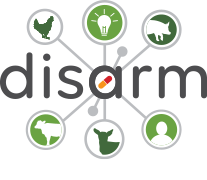In this section
In this section
Feeding management
Appropriate diet is important for all animals and housing and management practices should allow animals to easily access their daily feed ration. Overfeeding of animals should be prevented to avoid wasting precious nutrients and prevent opportunistic growth of pathogenic bacteria in the gut of the animals leading to infections and diarrhoea.
Feed should be stored so that it is protected from pests and moisture to avoid contamination and spoiling of the foodstuffs. Feeding equipment should be kept clean, particularly for young animals.

